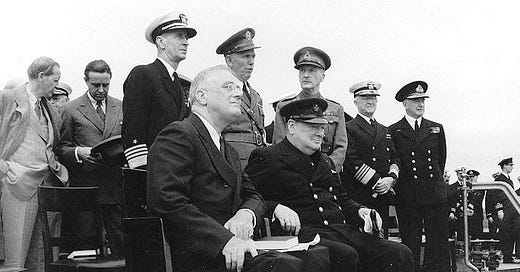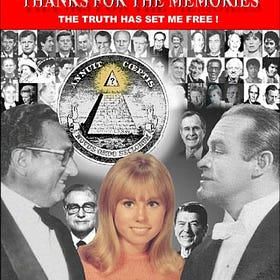Larry James - Time travel controller for the Montauk Project - part 4
"We changed the outcome of WWII"
Michael Houtzager (zager@webhoster.com) recorded this interview with engineer Larry James in the year, 2000. Michael’s web site is http://www.bielek.com/.
(Continued from part 3 https://dianabarahona.substack.com/p/larry-james-time-travel-controller-84a)
LARRY: Right. And to expand on that and help you understand a little bit more, let's take you up to World War II. World War II, had come down as Hitler had originally lost.
MICHAEL: That’s how I remember World War II, that Hitler lost.
LARRY: That was also changed to see what would happen, what the outcome would be if he had actually won.
MICHAEL: So, this was an experiment, then, right?
LARRY: It was an experiment.
MICHAEL: What if Hitler won the war? That was a question someone asked.
LARRY: Yeah.
MICHAEL: Okay. So, it was your job to go back with, I gues, a team of people.
LARRY: There were several that went back.
MICHAEL: Would you say it was a dozen?
LARRY: It was a large project for that one
MICHAEL: Were they mostly Montauk boys that were sent back?
LARRY: Well, actually, when you're changing history on such a grand scale involving wars, it involved great numbers of people.
MICHAEL: Thousands.
LARRY: Well, in the case of the Montauk boys, yes, because those were more, like I said, instruments and tools that were used, where we were more the controllers and players.
MICHAEL: So, what could have been done? I mean, in my mind, Hitler lost big-time. I mean, what could have been done so that the the tide of the war could have been changed?
LARRY: Well, I'll bring you up to date on that. It was just an experiment to see what would happen if he won. Did that, and said, okay, great, we see what happened. Now we need to
change it back to make sure that he lost.
And we can actually go back, and I actually have seen and held it, where we actually had night scopes back then. And there again, in the early ‘40s and mid-‘40s, whoever heard of a night scope, you know, infrared?
MICHAEL: Right. Didn't exist back then.
LARRY: Yeah, yet we can find evidence where they actually did exist. We had them, and they were built back then. We actually had a manufacturer who built them.
MICHAEL: But I don't think night scopes alone would have changed the war.
LARRY: No, but that was just one aspect. That helped in changing a lot of the aspects. There was a lot of political manipulation, along with battle manipulation, and giving new technologies. So, yeah, that was my point with the night scope was—
MICHAEL: So, that was one example, is what you’re saying.
LARRY: Yes, an example, that by introducing the night scope, that, of course, not many people had. You know, it wasn't something that was just handed out to, say, a regular infantryman. That was not part of his normal gear. Just the same as they weren't handed automatic weapons. There were only small groups that got automatic weapons during World War II.
MICHAEL: I think about the task, undertaking this task: it would have had to been enormous to change the tide of the war to Hitler winning it.
LARRY: Yeah.
MICHAEL: Where in the world would you get the resources to bear upon this project? I mean, because, you know, it took everything that the United States had to win the war. You would have to have had some resources equal to or above to what the United States had to change the tide of the war.
LARRY: Well, therein lies a lot of our funding. We did have black project funding, but we also did things, too. Like, we had purchased— most of our stuff was liquid. We bought property, buildings, that sort of thing, and then turned around and sold them many years later—20, 30 years later—and made 500 times the profit. And so, it got funding that way.
Stole a lot of it. I'm sure you've heard about Nazi gold and that sort of thing. And, you know, the stuff [gold bars] disappeared, and that's what it was, is we had stolen that liquefied asset and converted it over for us to use.
1:05:00 MICHAEL: So, how many billions of dollars do you think you eventually had in your coffers?
LARRY: Oh, I mean, we were spending the stuff as fast as we could get it, so there's no way to account. But yeah, and it goes into the billions as far as—
MICHAEL: Into the many billions.
LARRY: Yeah.
MICHAEL: Wow. But you know, you're spending this kind of money; don't you think eyebrows were raised somewhere saying, “Whoa. We just got a billion-dollar order from this underground facility in Montauk. Maybe we need to check this out.”
LARRY: No, because this is a big country. Let's say a large corporation buys a boatload of computers, okay? Nobody really questions where that money came from. They’re just, “Okay, we got this order for computers.”
MICHAEL: Yeah, they're just happy they got the order.
LARRY: Yeah. And because you buy things like that, and you don’t— they spread it out, because you need more than just one particular object. So, yeah, you guys are spreading things out. Nobody really pays attention.
MICHAEL: Okay. So, you talked about World War Two, changing the outcome, and then going back and saying, “Let's change it back.” What did you find that happened to this existence that, say, we're in right now had Hitler won? What would it have been like?
1:06:30 LARRY: One of the things was [that] he had several secret aircraft, which we do know of today, that we made sure that those never actually got off the ground. Those in actuality did. One of the things was [that] he did develop a bomber that was able to reach America. And one of our ways of deterring that in the outcome was we made sure that that bomber was shot down and it was never rebuilt.
MICHAEL: Okay, so, that's what you did to help—
LARRY: —to help bring things back.
MICHAEL: —bring things back. But on their own would they have still lost the war?
LARRY: Yeah, because what it was is that bomber, it was able to make it to America, it was no longer experimental, it ran into full production, and so, yeah, they had they had a long-range bomber. The other thing was is that they were working on nuclear physics, and they were able to develop the atomic bomb. And they were one of the world leaders in rocketry at the time, so, yeah, they had their own delivery system also. And, of course, they were also leaders in jet technology and jet propulsion. And so, yeah, they had jet fighters that [were far superior to] anything that we had because we had all props.
MICHAEL: So, but on on their own, assuming you didn't mess with space-time at all, would Germany have won or lost the war?
LARRY: No, they actually had lost originally.
MICHAEL: They lost the war. However, in order for you to get them to participate in this experiment where they had won the war, you were able to exploit things like their research and nuclear technology, their long-range bombers, their research into jet engines—
LARRY: That's correct.
MICHAEL: —and boost that along a little bit, and then that helped them to win the war in your experiment.
LARRY: Right.
MICHAEL: Okay. But now, when you went back, you had to shoot that bomber down, you had to destroy the jets, etc., right?
LARRY: Right.
MICHAEL: Okay. Now it brings up a question: what happens if you make too many changes in a timeline?
LARRY: Basically—and I believe we've discussed this earlier—if you're going back to a certain point, and you hit one specific reality too many times and you change it too many times in the same spot at the same time, you actually get a fracture, which ends up destroying that particular portion of time.
MICHAEL: Have you ever seen this happen?
LARRY: No, I have not, but I've heard that it's come close actually happening.
MICHAEL: And these fractures, does your perception of what you're seeing in front of you change if you're in that reality?
LARRY: Um, yeah, it does.
MICHAEL: Did you see kind of holes in the—
1:10:00 LARRY: Sure. You can actually feel it a little bit sometimes. Maybe that's just me because I was so much a part of the project and the process. But, yeah, I can feel it.
MICHAEL: Oh, so you could feel it if you went to one of these realities, that this was about to happen.
LARRY: Yeah.
MICHAEL: Okay. But to your knowledge, we've never blinked out a reality yet.
LARRY: Not to my knowledge.
Larry James - Time travel controller at the Montauk Project - part 5
Joe Kennedy, William Randolph Hearst, J.P. Morgan and others were part of a powerful underground group. They created their own revenue and their own justice, and they knew how to play by the rules to stay alive and in the game, but the rules suddenly changed with the power created by the [Satanic] Council as they utilized the Mob's success and made it t…





ok so what happened when hitler won???????????????????????